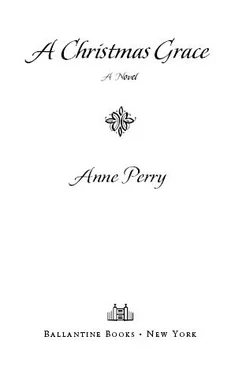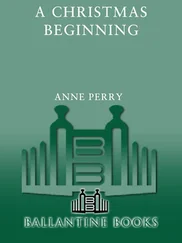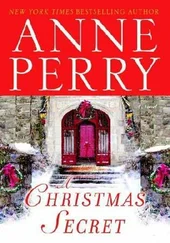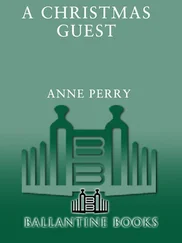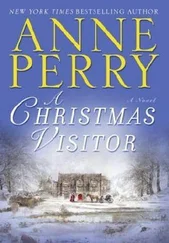Emily had turned over and over in her mind what she would ask, and she was still uncertain, but now there was no more time for debate. She looked at this woman’s tired eyes and the gnarled hands on her lap in front of her. She must have seen more than her share of grief. What kind of woman leaves her child to a foundling home to raise? Emily thought of her own children at home, and suddenly she missed them so intensely it was as if they had been torn from her. She could smell their skin, hear their voices, see the bright trust in their eyes. There was only one answer, a desperate woman, driven beyond the end of her strength, a hunted woman or a dying one.
“Connor Riordan was murdered,” she said bluntly and saw the matron wince as if she were familiar with that pain as well. “We never found out who killed him, but I believe I know why. I have a deep fear that the same thing is going to happen again, this time to Daniel, if we do not prevent it. I think Hugo Ross may have learned something here that later told him who was responsible, and because he loved his people, he chose not to repeat it. He died shortly after Connor’s death himself. He did not know that the poison of that guilt and fear was going to cause the village itself to die slowly. But his widow knows, and she wants above all things, before she dies, to put that right, perhaps for the village, but more, I think, for Hugo himself.”
“A good woman.” The matron nodded her head and made the sign of the cross with profound solemnity. “I cannot tell you much myself, but I recall that he spoke for some time to Mrs. Riordan, and that he asked quite a bit about Mrs. Yorke. That seemed to distress him. I asked him if I could do anything to help him, and he said not. Mrs. Riordan seemed upset as well, but when I spoke to her, she seemed to know little, but would not tell me why.”
“Mrs. Yorke?” Emily said confused.
“Well, we called her Mrs.,” the matron answered with a slight gesture of her hand, as if dismissing something trivial. “But she was not actually married. She worked here for many years, then she too died. But it was her time. She was old, and ready to continue her journey towards God.”
“Old?” Emily was surprised. Was she Padraic Yorke’s sister? Then she had to be considerably older than he. Or perhaps she was no relative. It was not a common name, but not unique by any means. “Might she be a relation of Mr. Padraic Yorke, who lives in the same village as Mrs. Ross?”
“Yes, yes,” the matron said with a sigh. “That she was. Though it’s a long time now, poor soul.”
“A long time? But you said she was old!”
“So she was, not so far from eighty when she died. Must be fifteen years ago now, or maybe more.”
Suddenly Emily was far colder than the room explained. Ugly thoughts crowded her mind, still shapeless. “She wasn’t his sister then?”
“No, my dear, she was his mother,” the matron said in surprise. “She came here before he was born. At first she said she was a widow, with child, but later she was honest with us. She was never married. A respectable girl to begin with, in service to a family in Holyhead, in England. When the master of the house got her with child she took ship and came to Ireland. She started in Dublin, but when the child began to show she was thrown out, and came west to Galway, where we took her in. She was happy here, and stayed with us for the rest of her days. A good woman she was, and we gave her the courtesy of a married title.”
“So Padraic was born here?” Emily said incredulously. It was not that the shame of his early life appalled her, although it must have been hard enough, it was that in the eyes of the Irish he was an Englishman, by blood and breeding, if never at heart.
The matron nodded. “Of course he had to leave when he was fourteen, because we couldn’t keep him any longer. There are no funds for children once they are old enough to work, and there was nothing here for him. He was a good student. He went to Dublin for a while, then up to Sligo, and at last to the coast, where he stayed.”
“And Mrs. Riordan knew all this,” Emily said slowly, as the ugliness inside her head took its shape. Connor must have pieced it together, understanding exactly who Padraic Yorke was, not the Irish poet and patriot he said, but the illegitimate son of some rich Englishman and his cast-off maidservant. Would Connor have told anyone? Who dared take the chance that he would not?
“Thank you,” Emily said to the matron, standing up with sudden stiffness as if all her bones ached. “I shall go back tomorrow to tell Susannah what I have learned. Then at least she will know. What she chooses to do about it is up to her.”
She spent the rest of the day in Galway because she did not dare take the long road back when she would make the last of the journey in the dark. She paid her bill after breakfast and was on the road by nine, but it was with a heaviness inside her. She understood so easily why Hugo Ross had chosen to say nothing.
Padraic Yorke had killed Connor and it was probably murder. At the very best it was a fight that had gone disastrously wrong. But no one other than Yorke himself knew what had happened, the mockery, the laughter, the humiliation he might have suffered. It could have been a lashing out at unbearable jeering, perhaps even an obscene insult to his mother, surely a victim enough already. It could have been at least half an accident, never meant to end in death.
Or it could have been quite clearly a murder, even a blow from behind delivered the coward’s way against a man who had come by information by chance, and had never intended to use it.
Had Hugo Ross known? Had he spoken to Padraic Yorke? Or had he kept silence as well? Did he even know what he was concealing? She thought, from what Susannah had said of him, that probably he had known very well.
What he had not known was how the fear and the guilt would slowly poison the very fabric of the village until it was withering, day by day, a new suspicion here, a fear awakened there, another lie to cover an older one; Father Tyndale’s self-doubt, and ultimately his doubt even of God.
She was past the lake and heading towards Oughterard, the wind tearing blue holes in a ragged sky and the sun brilliant on the hills. The slopes were almost gold, black stone ruins gleaming wet and sharp, when she saw a man in the road ahead of her. He was walking steadily, as if he were pacing himself to go far. She wondered if he lived in Oughterard. There was no house or farm anywhere in sight to either side of the road.
Should she offer him a lift? It seemed unwise. And yet it was inhumane to pass him and let him make his own way, against the wind on this rough road.
It was not until she was level with him that she recognized Brendan Flaherty. She pulled up the pony.
“Can I offer you a ride, Mr. Flaherty?” she said. “I’m heading home.”
“Home, is it?” he said with a smile. “Sure, that’s very good of you, Mrs. Radley. And I’ll be happy to drive for you, if you like. Though Jenny knows her way as well as I do.”
She accepted because she was tired, and although she was a good rider, she was completely inexperienced at driving, and she was sure Jenny was aware of it.
They had gone well over a mile before Brendan spoke.
“I shouldn’t have run away,” he said quietly, facing forward, avoiding her eyes.
“You’re coming back,” she replied. Now that she knew the truth about Padraic Yorke she no longer had any fear of Brendan.
He gave a little grunt, wordless, but heavy with emotion.
She felt the weight of sadness in him, as if he were returning to an imprisonment.
“Why are you coming back?” she asked impulsively. “Are you afraid that if you stay in Galway that you’ll end up like your father, drinking too much, fighting, and in the end alone?”
Читать дальше
